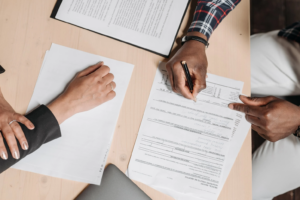When seeking legal advice or representation, effective communication with your lawyer is crucial. Clearly articulating your legal needs ensures that your lawyer understands your objectives and can provide tailored guidance.
1. Prepare in Advance:
Before meeting with your lawyer, take the time to organize your thoughts and gather relevant documents. Jot down key points, questions, and any concerns you may have. This preparation will help you communicate your needs more clearly and ensure that you don’t forget any important details during your discussion.
2. Be Honest and Transparent:
Openness and honesty are essential when communicating with your lawyer. Provide them with all the relevant information, even if it seems insignificant. Remember, your lawyer is bound by confidentiality, so you can feel comfortable sharing any sensitive details that may impact your case.
3. Clearly Define Your Objectives:
Clearly articulate your desired outcomes and objectives to your lawyer. Whether you’re seeking legal advice, representation, or assistance with a specific legal matter, be specific about what you hope to achieve. This clarity will help your lawyer understand your goals and develop an appropriate strategy.
 4. Ask Questions:
4. Ask Questions:
Don’t hesitate to ask questions if you don’t understand legal jargon or concepts. Your lawyer is there to guide you and provide clarity. Seek explanations, request examples, and ask for additional information if needed. A good lawyer will take the time to ensure you fully understand the legal aspects of your case.
5. Provide Relevant Documentation:
If you have any documents or evidence related to your legal matter, provide them to your lawyer. These documents can help them better understand the situation and provide more accurate advice. Organize the documents in a logical manner and explain their relevance to your case.
6. Express Your Concerns:
If you have any concerns or fears about your legal matter, don’t hesitate to share them with your lawyer. They can address your concerns and provide reassurance or guidance. Clear communication about your worries will help your lawyer develop a strategy that takes your emotional well-being into account.
7. Keep Communication Channels Open:
Maintain open lines of communication with your lawyer throughout the process. Respond promptly to their requests for information or clarification. If you have new information or updates, share them promptly. Regular communication ensures that your lawyer has the most up-to-date information to effectively represent your interests.
8. Take Notes:
During discussions with your lawyer, take notes to help you remember important details and advice. These notes can serve as a reference point and help you stay organized. If you have any follow-up questions or need clarification, refer to your notes when communicating with your lawyer.
Effective communication is the cornerstone of a successful lawyer-client relationship. By preparing in advance, being honest and transparent, clearly defining your objectives, asking questions, providing relevant documentation, expressing concerns, keeping communication channels open, and taking notes, you can effectively communicate your legal needs to your lawyer. This ensures that they have a comprehensive understanding of your situation, enabling them to provide tailored advice and representation that aligns with your goals. Remember, effective communication is a collaborative effort that enhances the overall success of your legal journey.
